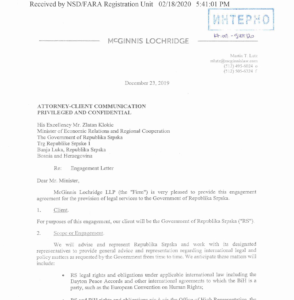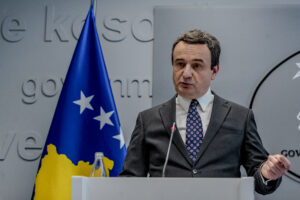In a dynamic and intricate geopolitical landscape, the role of international envoys often transcends mere diplomacy, becoming a critical fulcrum in maintaining balance between historical adversaries. This delicate equilibrium is presently under scrutiny in the Balkans, where the actions of U.S. envoy Gabriel Escobar have sparked controversy and raised serious questions about the integrity of American diplomatic efforts in this tension-riddled region.
The backdrop of the current diplomatic conundrum is the Balkans’ complex and tumultuous history. The region, particularly the relationship between Kosovo and Serbia, is a mosaic of ethnic tensions and unresolved grievances, stemming from the brutal wars of the 1990s. Kosovo’s declaration of independence in 2008, while recognized by Western nations including the U.S., failed to fully close the chapters of its troubled past. Serbia’s non-recognition of Kosovo’s sovereignty, bolstered by Russian support, continues to be a major source of instability.
Into this already volatile setting steps Deputy Assistant Secretary, Bureau of European and Eurasian Affairs, Gabriel Escobar, otherwise the U.S. envoy to the Kosovo-Serbia dialogue. Allegations have surfaced that Escobar’s actions in Kosovo are biased and potentially compromised, given reported financial ties between his wife and Serbia’s Foreign Affairs Ministry. These associations cast a shadow over the expected neutrality and impartiality of an international envoy and raise doubts about his actions during critical diplomatic events, such as the June-August 2023 crisis in northern Mirovica region and the attempted annexation in northern Kosovo by Serbian-backed paramilitary forces.

Further findings by THE Frontliner Magazine of a legal contract between McGinnis Lochridge LLP and the Government of Republika Srpska, dated December 23, 2019, adds a new layer of intrigue. This contract, which stipulates monthly payments of $80,000 to the law firm for advising and representing Republika Srpska in international legal matters, casts a spotlight on the familial connection between Manuel Escobar, a partner at the firm, and Gabriel Escobar, the U.S. Deputy Assistant Secretary for the Bureau of European and Eurasian Affairs.
This revelation is particularly poignant given Gabriel Escobar’s critical role in the delicate Kosovo-Serbia dialogue. Although alleged family ties do not inherently equate to conflicts of interest, in the nuanced realm of diplomacy, they can engender perceptions of bias, calling into question the impartiality necessary in such sensitive negotiations. This scenario underscores the paramount importance of ethical adherence, transparency, and the avoidance of any perceived conflicts of interest, not only to preserve the integrity of individual diplomats like Gabriel Escobar but also to safeguard the legitimacy and credibility of the diplomatic processes they are entrusted with.
These associations, though not inherently indicative of direct conflict, fuel concerns about hidden agendas and compromised integrity. In such a delicate and high-stakes environment, these revelations are alarming, as they not only question the motives and actions of a key diplomatic player but also potentially jeopardise the integrity and effectiveness of the entire diplomatic process in a region already fraught with tension and historical complexity.

The implications of Escobar’s conduct are far-reaching, extending beyond personal credibility to the broader credibility of U.S. diplomacy in the Balkans. At stake is the traditional role of the U.S. as a supporter of Kosovo’s sovereignty and democracy. The perception of bias or compromise in its representatives can critically undermine this role and destabilise the fragile peace in the region. The allegations against Escobar and his family’s ties to Serbia and Kremlin-linked interests demand a thorough investigation and transparency. It’s important to note that if these claims are verified, it might prompt a reassessment of his involvement and, in a wider context, lead to a review of U.S. diplomatic approaches in the Balkans.
This Friday, I was invited by the U.S. Strategic Communication Department to a briefing with Assistant Secretary of the Bureau of European and Eurasian Affairs James O’Brien and Deputy Assistant Secretary Gabriel Escobar. The purpose of this call was for the envoys to provide insights into a recent meeting of Western Balkans envoys and to discuss the 25th anniversary of Operation Allied Force in Kosovo. However, during the call, my questions as a reporter from FRONTLINER Magazine, specifically concerning Escobar’s alleged conflicts of interest and their impact on U.S.-Kosovo relations, were blatantly ignored. This lack of response to my direct inquiries signalled a possible reluctance or unpreparedness to address these critical issues.

In a separate interaction, when I questioned Kosovo’s Prime Minister Albin Kurti about Escobar’s alleged financial ties and biases, he sidestepped the issue, suggesting that such questions should be directed to the U.S. Department of State. His diplomatic yet evasive response highlighted the complexities and sensitivities of this situation, pointing to the difficulties in confronting such allegations within the interwoven contexts of international relations and internal politics.
This evolving situation concerning Gabriel Escobar in Kosovo starkly reminds me of the intricacies and potential hazards inherent in diplomacy, especially in regions with a history of conflicts and ongoing instabilities. It emphasises the crucial need for envoys to adhere to the highest standards of conduct, acting with impartiality, transparency, and a commitment to the long-term interests of the nations they represent. As Kosovo continues on its journey as an emerging nation, the role and decisions of international actors like the U.S. are increasingly significant, shaping the future of the Balkans. This ongoing scenario not only poses a diplomatic challenge but also serves as a test of the guiding principles and efficacy of international diplomacy in one of Europe’s most historically complex regions.
Escobar’s actions, clouded by familial financial ties and alleged biases, have cast a long shadow over the U.S.’s diplomatic integrity in the Balkans—a region where the U.S. has historically played a crucial role in maintaining peace and fostering democracy. The inaction and silence of the State Department in the face of these serious allegations not only undermine the efforts to stabilise this historically turbulent region but also betray the fundamental principles of transparency and accountability that are the bedrock of effective diplomacy.
The refusal to address these concerns publicly, as evident in the Strategic Communication Department’s evasion of pointed questions, is not just a missed opportunity for clarity but a blatant disregard for the principles of open and responsible governance. Such a stance not only tarnishes the reputation of the individuals involved but, more critically, jeopardises the perceived impartiality and effectiveness of the entire U.S. diplomatic mission.
The situation with Escobar is a stark reminder of the fragility of diplomatic trust and the ease with which it can be compromised. It underscores the imperative for stringent ethical standards and rigorous oversight in diplomatic appointments and dealings, especially in regions as volatile and complex as the Balkans. The U.S. State Department’s apparent complacency and lack of transparency in this matter do not merely reflect poorly on a single envoy or department; they signify a systemic failure that must be addressed with utmost urgency.
As we navigate a world rife with geopolitical complexities and shifting alliances, the necessity for diplomatic integrity and accountability cannot be overstated. The U.S. must not only investigate and address the allegations against Escobar but also take decisive steps to reinforce the ethical framework within which its diplomats operate. Only then can it hope to restore trust and continue to play a constructive role in the delicate balance of international relations, particularly in the sensitive and pivotal region of the Balkans.
Vudi Xhymshiti, founder and chief editor of The Frontliner Magazine, brings a wealth of experience in reporting on global armed conflicts and political issues. With a background in Documentary Photography and Photojournalism from the University of the Arts London, and studies in Political Science, International Relations, and Diplomacy, Vudi skilfully merges human rights insights with dedicated journalism. His ethical and thoughtful reporting has graced top publications like The Guardian and The New York Times. At The Frontliner, launched in 2023, he explores the profound effects of conflicts on law, human rights, and freedoms, continuing his commitment to impactful storytelling.


